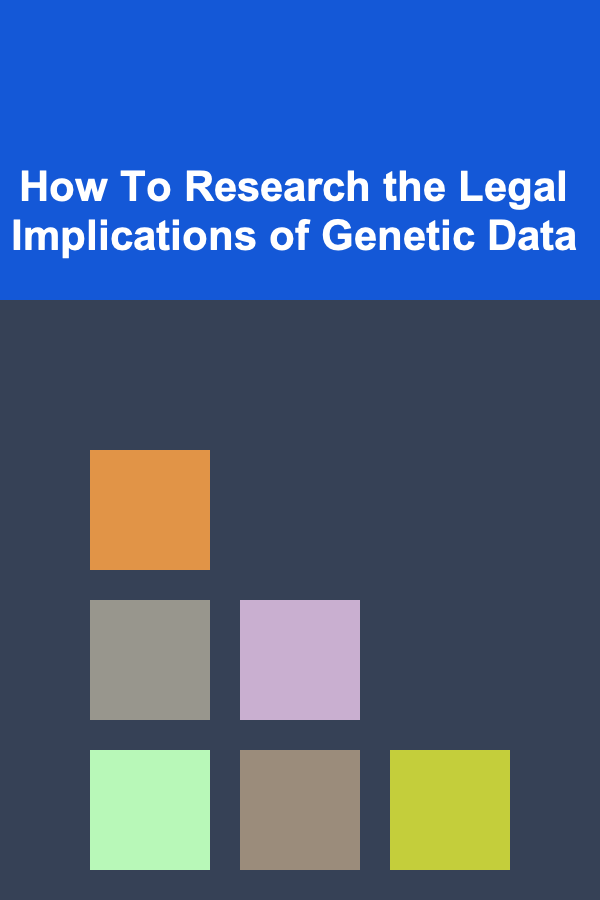
How To Research the Legal Implications of Genetic Data
ebook include PDF & Audio bundle (Micro Guide)
$12.99$9.99
Limited Time Offer! Order within the next:

The advent of genetic technologies has revolutionized fields such as medicine, law enforcement, and ancestry research. While these advances hold tremendous promise, they also raise significant legal, ethical, and social challenges. As genetic data becomes more accessible, understanding its legal implications has become crucial. This article will guide you through the key steps and considerations for researching the legal implications of genetic data, touching on regulatory frameworks, privacy concerns, intellectual property issues, and the role of informed consent.
Understanding Genetic Data
Genetic data refers to information derived from an individual's DNA, such as genetic sequences, variations, and mutations. This information can provide insights into an individual's health risks, ancestry, and predisposition to certain diseases. With the increasing use of technologies like next-generation sequencing (NGS), genetic testing has become faster, cheaper, and more accessible to both medical professionals and the public.
As genetic data becomes increasingly available, its usage has proliferated across various sectors. Genetic testing is used for medical diagnostics, forensic identification, pharmaceutical development, and even in consumer products like genetic ancestry testing kits. This widespread use brings about an array of legal challenges regarding data privacy, intellectual property, consent, and discrimination.
Step 1: Understanding the Regulatory Frameworks
The first step in researching the legal implications of genetic data is to familiarize yourself with the existing laws and regulations governing its use. Legal frameworks vary by country and region, but there are some key laws and regulations to be aware of globally.
The General Data Protection Regulation (GDPR)
In the European Union (EU), the General Data Protection Regulation (GDPR) is one of the most significant legal frameworks for genetic data. The GDPR treats genetic data as a special category of personal data, requiring additional protection. This regulation emphasizes the need for informed consent, transparency, and data security when processing genetic information.
Under the GDPR, genetic data cannot be processed without the explicit consent of the individual, unless there is a legitimate interest or a legal obligation to do so. It also grants individuals the right to access their genetic data and request its deletion or correction.
Additionally, GDPR mandates that organizations handling genetic data must implement adequate safeguards to ensure that the data is stored securely and only accessed by authorized personnel.
The Health Insurance Portability and Accountability Act (HIPAA)
In the United States, the Health Insurance Portability and Accountability Act (HIPAA) governs the protection of genetic information in healthcare contexts. HIPAA's Privacy Rule ensures that individuals' medical records, including genetic data, are kept confidential and are not shared without the individual's consent.
HIPAA also addresses the use of genetic data in health insurance. The Genetic Information Nondiscrimination Act (GINA) of 2008, a part of HIPAA, prohibits employers and health insurers from discriminating against individuals based on their genetic information. This law protects individuals from being denied coverage or facing higher premiums because of genetic predispositions to certain diseases.
The National Human Genome Research Institute (NHGRI) Guidelines
In the U.S., the National Human Genome Research Institute (NHGRI) provides guidelines and ethical standards for the use of genetic data. These guidelines emphasize the need for informed consent, transparency in data sharing, and considerations for privacy and confidentiality.
NHGRI's research focuses on the ethical, legal, and social implications of genomic research, including the rights of individuals in genetic studies and the proper use of genetic information. Researchers must adhere to ethical standards that respect individuals' privacy while promoting scientific discovery.
International Legal Considerations
Globally, there is no universal legal framework governing genetic data. However, many countries have adopted their own laws and policies. For example, Canada's Personal Information Protection and Electronic Documents Act (PIPEDA) governs the collection, use, and disclosure of personal data, including genetic information. In countries like China and India, emerging laws are starting to address the privacy and ethical considerations of genetic data as the use of genomics in healthcare and research increases.
International organizations like the World Health Organization (WHO) and the Organization for Economic Cooperation and Development (OECD) are also developing frameworks to ensure ethical and legal considerations are addressed globally. This includes ensuring equitable access to genomic technologies and protecting individuals' rights in a rapidly evolving field.
Step 2: Ethical Considerations and Informed Consent
One of the most complex legal implications of genetic data lies in the ethical questions surrounding its collection, use, and sharing. Ethical considerations often intersect with legal requirements, particularly when it comes to issues of informed consent.
Informed Consent
Informed consent is a foundational principle in both medical ethics and law. It ensures that individuals understand what their genetic data will be used for and agree to it voluntarily. This is especially important in genetic research, where data may be shared with third parties or used for purposes beyond the original scope of the study.
Research on genetic data has raised concerns about individuals' understanding of what they are consenting to. Some may not fully grasp the implications of providing genetic samples or sharing genetic information, especially as the potential uses for such data expand over time.
For example, genetic testing in the healthcare setting may reveal predispositions to diseases like cancer or Alzheimer's. The individual's consent must include an understanding of how this information will be used, who will have access to it, and the potential impact on their health and privacy.
Informed consent for genetic research should also include considerations of data storage and usage. Researchers must clarify how long data will be stored, how it will be protected, and whether it will be shared with other researchers or organizations. Individuals should also be informed about their rights to withdraw consent at any time and request the destruction of their genetic data.
Ethical Use of Genetic Data
Beyond informed consent, there are additional ethical concerns regarding the use of genetic data. These include the potential for misuse in areas such as genetic discrimination, exploitation of vulnerable populations, and inequitable access to genetic technologies.
Genetic Discrimination
One of the most pressing legal concerns regarding genetic data is the potential for discrimination. Genetic information could be used to deny individuals access to employment, insurance, or medical treatment. This could create disparities in health outcomes, particularly if individuals are unfairly labeled as high-risk based on their genetic profile.
Laws like the Genetic Information Nondiscrimination Act (GINA) in the U.S. aim to mitigate such risks by prohibiting discrimination based on genetic information in employment and health insurance. However, these protections do not extend to other areas, such as life insurance or long-term care insurance, raising concerns about gaps in legal protections.
Exploitation of Vulnerable Populations
There are concerns about the exploitation of vulnerable populations in genetic research. Certain groups, such as indigenous communities or economically disadvantaged individuals, may be more susceptible to the risks associated with the misuse of genetic data. This includes concerns about informed consent and whether individuals in these populations fully understand the potential consequences of sharing their genetic information.
To address these concerns, researchers and organizations must adopt ethical guidelines that ensure vulnerable populations are protected and that their participation in genetic research is voluntary and informed.
Secondary Use of Genetic Data
Another ethical concern is the secondary use of genetic data, where data collected for one purpose may later be used for other purposes. For example, genetic data collected in a clinical setting may later be shared with pharmaceutical companies for drug development or used for population-based research.
While this may advance scientific progress, it raises questions about privacy, ownership, and consent. Individuals may not be aware that their genetic data will be used beyond the initial context in which it was provided. Legal protections must ensure that individuals' rights are respected when their genetic data is used for secondary purposes.
Step 3: Privacy and Security of Genetic Data
Privacy and security are paramount when dealing with sensitive genetic data. As genetic testing becomes more widespread, ensuring the confidentiality and integrity of genetic data is critical to maintaining public trust in genetic technologies.
Data Privacy Laws
Data privacy laws, like the GDPR and HIPAA, offer important protections for genetic data. However, many of these laws were created before the rapid advancements in genetic technologies, and there are concerns that they may not fully address the complexities of genetic data. For instance, genetic data may not be easily anonymized, and the possibility of re-identifying individuals from anonymized genetic data has raised concerns about privacy.
Researchers and organizations must ensure that genetic data is protected through encryption, secure storage, and controlled access. Additionally, they must inform individuals about how their data will be protected and what measures are in place to prevent breaches.
Data Breaches and Cybersecurity
The increasing use of genetic data also makes it a target for cyberattacks. Breaches of genetic data can lead to serious privacy violations, including the exposure of individuals' most personal and sensitive information. Such breaches could have significant consequences for individuals, including the risk of identity theft, genetic discrimination, or harm to their reputation.
Legal frameworks must address the potential risks of cybersecurity breaches and ensure that organizations take proactive measures to protect genetic data from cyberattacks.
Step 4: Intellectual Property and Ownership
Another area of concern in the legal landscape of genetic data is intellectual property (IP) rights. As genetic data is increasingly used in research and product development, questions about ownership, patenting, and the commercialization of genetic data are emerging.
Patentability of Genetic Data
In some jurisdictions, genetic information is eligible for patenting, provided that it meets certain criteria such as novelty and utility. Patents on genes, genetic sequences, or genetic technologies have sparked significant debate. Critics argue that patenting genetic information raises ethical concerns, as it may limit access to essential genetic tests or therapies, particularly in low-income or developing countries.
Legal scholars and policymakers continue to debate whether genetic information should be subject to patents and, if so, how to balance IP protection with the broader goal of ensuring equitable access to genetic advancements.
Ownership of Genetic Data
Ownership of genetic data is another key issue. Individuals may provide their genetic data for research or medical purposes, but who ultimately owns that data? In many cases, individuals may retain ownership of their genetic information, but once it is shared with healthcare providers, researchers, or commercial entities, questions about data ownership and control arise.
Legal frameworks need to clarify the ownership of genetic data, especially when it is used for commercial purposes or shared across international borders. Individuals should be informed of their rights regarding ownership and control over their genetic data.
Conclusion
The legal implications of genetic data are vast and complex, spanning multiple areas of law including privacy, consent, intellectual property, and discrimination. As genetic technologies continue to evolve, it is essential to keep pace with the legal frameworks that govern their use. Researchers, policymakers, and legal professionals must work together to ensure that genetic data is used responsibly and ethically, protecting individuals' rights while fostering innovation in this exciting field.
By understanding the regulatory frameworks, addressing ethical considerations, ensuring privacy and security, and clarifying ownership issues, we can ensure that genetic data is handled in a way that benefits society while respecting the rights of individuals.

How to Innovate Your Way to Greater Profit
Read More
How to Organize Your Child's School Year Supplies
Read More
How to Organize Your Garden Tools and Supplies
Read More
How to Stage Your Home's Walls to Enhance Space
Read More
How To Prevent Gallstones Naturally
Read More
Achieving Work-Life Balance as an Entrepreneur: A Comprehensive Guide
Read MoreOther Products

How to Innovate Your Way to Greater Profit
Read More
How to Organize Your Child's School Year Supplies
Read More
How to Organize Your Garden Tools and Supplies
Read More
How to Stage Your Home's Walls to Enhance Space
Read More
How To Prevent Gallstones Naturally
Read More